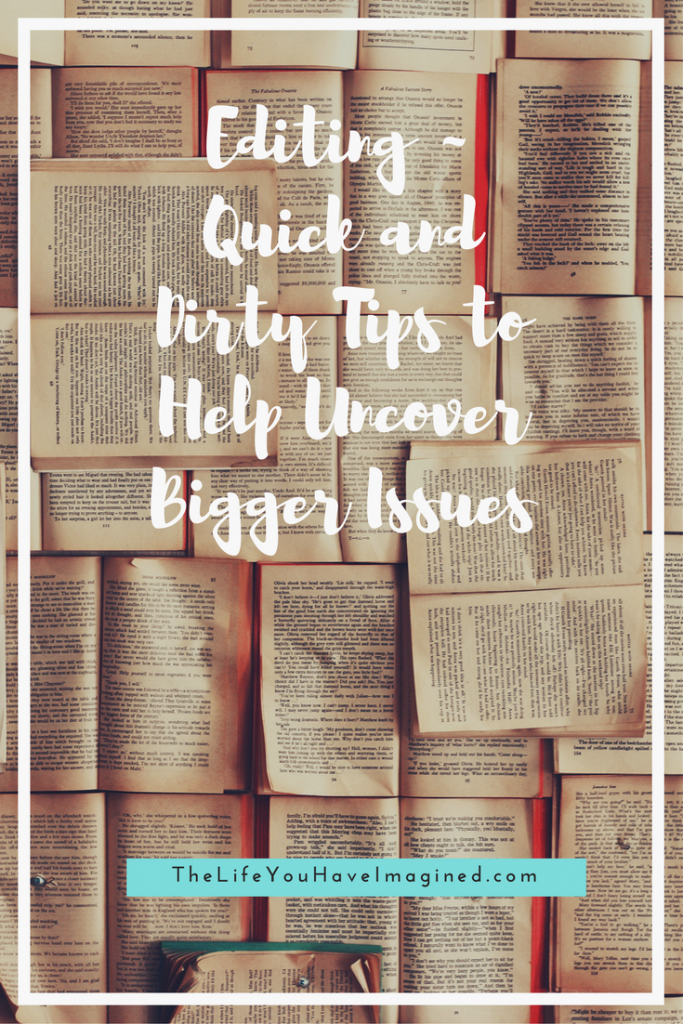“Substitute ‘damn’ every time you’re inclined to write ‘very;’ your editor will delete it and the writing will be just as it should be.” ? Mark Twain
When it comes to writers, everyone has their own writing and editing process, and there are lots of people out there giving advice on how to go about it. I’ve taken and taught classes and read and researched the topic, and I’ve found most people to recommend revising big issues first while completely ignoring line edits until last.
But I want to turn this idea on its head.
Writing is hard. Editing can be even harder. Sitting down to read your first draft after putting months or years of work into it can be disheartening. Who wouldn’t want to throw the thing out the window when a really rough document and that pesky inner critic gang up on you to tell you that it’s crap?
Instead, I suggest a few simple steps that, if completed before sitting down to revise your novel or story, will help clear away the detritus of easy-to-fix writing errors and instead allow you to focus on uncovering the bigger issues without cringing, panicking, or giving up writing altogether as you read.
Note: I find this method to be especially helpful for grammar nuts like me or people who write their novels quickly, such as those participating in NaNoWriMo.
Editing Prep in 4 Easy Steps:
Step 1: Take your hands off the keyboard and step away from your novel slowly. You need to put some time and space between you and your finished first draft. When you come back to edit, it should be with fresh eyes. Give it a month to six weeks and start writing a different story or do a bunch of reading until you’ve forgotten what you wrote.
Step 2: It is now safe to return. Get comfy, take a deep breath, and open that document. But don’t read it yet. Really? Yes, really. Instead, get familiar with the ‘Find’ function. The following are a list of words you need to search for and instructions on what to do once you find them. And you will find them. Many of them:
- “That” ~ Read the sentence without it, if it works, delete it. If you can change it to “who,” do it. If none of that works, it can stay. Begrudgingly.
- “Just” ~ Read the sentence without it, then delete it. This works 99% of the time.
- “Not” ~ Most contractions include this word. If you find it in your writing, turn it into the contraction unless it’s being used for emphasis.
- “Am/Is/Are/Was/Were” ~ We’re talking about passive voice. Take it out, find a more active verb, or reword the sentence whenever possible.
- “ly” ~ As Stephen King says, “The road to hell is paved with adverbs.” Doing this search will help you seek and destroy them, either with the delete button or some stronger verbs. This includes “actually,” “basically,” and “literally,” unless used for effect/characterization.
- “Many/Few/Often” ~ Be specific!
- “Begin to” ~ Boring and usually redundant. Give it hell.
- “Really/Very” ~ Perhaps follow Mark Twain’s advice above.
Step 3: Print it out. Yes, it’s a lot of pages, but if you typed it all out on the computer, it’s going to help to look at it in a different format. Plus, seeing that beautiful stack of paper is going to make you feel good. And you’re going to want to feel good. You made this! It’s a huge accomplishment!
That’s important to remember when you grab a pen (Tip: Be kind to yourself and don’t use red!) and settle in to start reading. Luckily, you completed the steps above and should be significantly less distracted by glaring grammatical errors and clunky or stilted writing. This will allow you to really focus on what’s there.
Step 4: It’s time to read and mark away. I like to write directly on the page. If something doesn’t make sense, note it. If there’s a theme you want to deepen, write it. If the writing gets boring or redundant, cross it out. There are a few other things to look for here:
- Dialogue signals ~ If you use anything other than “said,” get rid of it.
- Contractions ~ Keep an eye out for contractions that don’t use “not” and make a note.
- Adjectives ~ You hopefully got rid of most of the adverbs previously, so now’s the time to look out for adjectives. Use them sparingly.
- Weak verbs ~ Look out for weak and overused verbs like went, sat, walked, felt, turned, etc. Either find a more interesting replacement that gives more information or rewrite the sentence to “show, not tell.”
- Point of view ~ If you’re writing from one point of view, be sure to stick with it throughout. If you’re writing from multiple points of view, make sure that each scene only has one to avoid confusing your reader. If you’re unsure, ask yourself who’s head are you in?
- When in doubt ~ Cut it out. If you get the feeling there might be too much backstory in one scene, or too much description in another, trust your gut. You feel that way for a reason.
Remember, as Hemingway said, “The first draft of anything is shit.” The important thing is that you wrote it. Now it’s time to make it shine!


I’m not on Pinterest yet, but if I was, I would pin this in a heartbeat! I myself really need to work on my editing skills, but I find the writing part is so much more fun 🙂 Great information!
It definitely is more fun! Must it’s also so satisfying to see the finished product after editing 🙂
I love your tips! I especially like step 1 – it always looks different when I come back to edit with fresh eyes. 🙂
Right? It’s so much easier to spot the errors and word tweaks 🙂